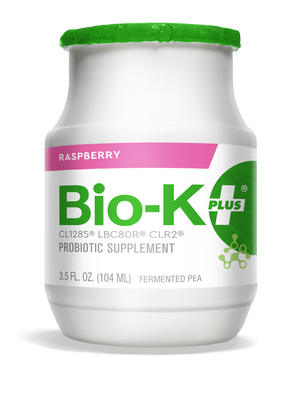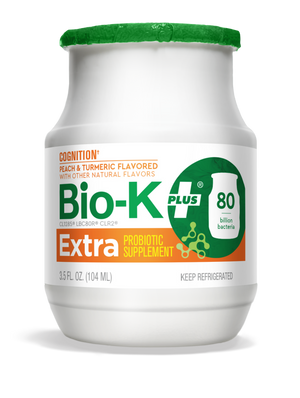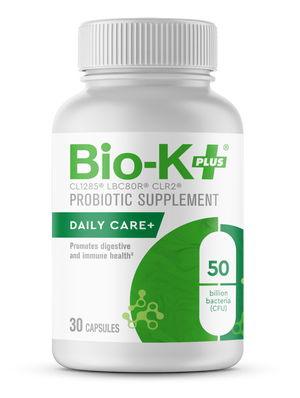How Stress and Gut Health Intertwine
Stress is a common occurrence for most Americans, and medical scientists have found that the effects of stress have more impact on our gut than known before.8 When you are stressed, it is not uncommon to take on bad eating habits or lose sleep. This, along with other internal and environmental factors, can cause an immediate backlash in our gut. We hope to show how stress affects your digestive system, how your gut health can affect your mood, why you should consider taking probiotics, and give you ways to combat this vicious cycle. To learn more about the relationship between stress and gut health, read on.
Can stress cause digestive issues?
Your gut is partly controlled by the central nervous system, brain, and spinal cord. The vagus nerve is the longest and most complex nerve that runs down the spinal cord from brain to gut and is the main highway of communication between these two critical parts of our body3. The gut-brain connection is so strong that your stomach’s physical reactions, like a release of juices, can happen before any food is even eaten.9
When people feel stressed, one of the first things they may notice is the butterflies or uneasiness in their stomach. These feelings are not imagined. When stressed, your body may release cortisol and go into a fight or flight response. Stress can shut down the vagus nerve, and while that is shut down, the gut lining becomes more permeable, and pathogens, contaminants, or toxins can enter the blood flow.3
A stressful situation can cause your esophagus to go into spasms, an increase in stomach acid, and even indigestion, nausea, and diarrhea. Stress can even cause a decrease in blood flow and oxygen in the stomach.1
Can stress and anxiety cause digestive problems?
People who suffer from chronic digestive issues like Irritable bowel syndrome (IBS), inflammatory bowel disease (IBD), Pepcid ulcers, and gastroesophageal reflux disease (GERD) may be affected by stress even more. The Gastrointestinal (GI) tract is sensitive to emotions. Anxiety, depression, and other psychological factors can affect movement and contraction of the GI tract2. People with chronic digestive disorders may experience more pain or stronger reactions to pain than others because their system is so sensitive to changes in the GI tract.
Although it may not be the cause of the digestive issue, certain studies have shown how stress can make symptoms worse. In people with IBD, stress can increase the risk of a relapse. In a study of 600 people whose gastroenteritis was caused by the bacterium Campylobacter, researchers found that those patients who could handle stress before they were infected were less likely to develop IBS.4
In patients with IBS, antidepressants and psychological treatments are commonly prescribed by doctors. Antidepressants help block pain messages that go from your brain to your gut. When this happens, patients with IBS suffer less hypersensitivity. Certain antidepressants can also help stem symptoms like diarrhea and constipation.5
The connection between brain and gut is strong, and the way your brain reacts to stress will affect your digestive system. So, what can you do about it? If you are not interested in taking antidepressants, and cannot afford therapy, other natural stress-relieving activities can have a significant effect on digestive problems. Exercise, yoga, meditation, and learning to manage your time can all help relieve stress and help maintain your gut health. Learn more about how to improve digestion naturally.
Is anxiety related to gut health?
Your gut houses its own network of neurons. In fact, there are more neurons in your gut than in your spinal cord. Neurons line the gastrointestinal system and control your body’s ability to swallow, break down food, and decide whether food is a nutrient or waste.1 The communication between the gastrointestinal tract (GI) and brain, through the vagus nerve, is also bidirectional. Through this pathway, messages come from the brain to the GI tract, but the messages that come from the GI tract to the brain are even stronger.3
An unbalanced gut can cause issues with mood and can increase anxiety and stress in your life. Harmful bacteria can influence anxiety and stress. Those who experience leaky gut often also suffer from chronic inflammation of the gut. Many of these individuals also have anxiety or depression.10
On the other hand, a balanced and healthy gut can increase your body’s ability to fight off stress. Some bacteria like Lactobacillus rhamnosus or Lactobacillus farciminis could lower the increase of stress hormones.3 Specific Lactobacillus probiotic strains could, according to a study, help some people improve stress resilience and lessen anxiety, memory loss, or other cognitive dysfunctions.11 To learn more about these probiotic strains and others, visit our blog.
As you can see, the health of your gut can affect your brain and the rest of your body, so what can you do to build better gut health?
Healthier Diet
A good way to build a healthier gut is with a healthy diet. The term can feel a little vague, especially with all the different diets out there in the world. Americans’ diets are, unfortunately, one of the worst. Too many Americans have a diet of red meat, processed foods, sugar, and sweeteners. Here are a few specific food areas that can help you build a healthier gut.6
1. Mediterranean Diet
The Mediterranean diet has proven over the years its benefits for human health. The major components of this diet, namely fibers, polyunsaturated fats, polyphenols, probiotics, and the reduction in the consumption of red meat have an important effect on the composition of the intestinal microbiota.
2. High-fiber foods
Broccoli, brussel sprouts, oats, peas, avocados, pears, bananas, and berries are high in fiber and can help to feed the beneficial bacteria in your gut. This kind of food may not fit to your tolerance, ask a registered dietitian for further explanations if this is the case.
3. Foods high in omega-3 fatty acids (Polyunsaturated fats)
Food like salmon, mackerel, and flax seeds are high in omega-3s and can help reduce inflammation.
4. Probiotic and prebiotic foods
Probiotic foods have probiotic bacteria naturally or have probiotics added like sauerkraut, kimchi, kefir, apple cider vinegar, high-quality yogurt, pickles, and some cheeses. Prebiotic foods are high-fiber foods like leeks, onions, garlic, and bananas. They both can help increase good gut bacteria help support your digestive system.
Eat Slower
This may seem like an odd thing to mention when talking about stress and gut health, but it can help with both. When you eat slowly, you digest your food better, and you feel fuller and more satisfied.12 You will also slow down your day and take some needed time to relax and destress. Eating slowly gives your digestive system time to work through all the steps it needs to do.
When you eat your meals too quickly, your food is not chewed as well as it could be. Food that is not chewed well enough is harder to digest and can lead to indigestion and other gastrointestinal problems. A few tips to help you eat slower include:7
-
Sit down to eat
-
If you tolerate this type of meal, choose high-fiber foods that take more time to chew
-
Put down your utensils between bites
-
Set a minimum number of chews per bite
-
Use smaller plates
-
Take a moment to refocus when eating too fast
-
Schedule time to eat a meal
-
Find a slow eater to mimic
Take Probiotics
While a healthy diet and eating slower seem ideal, it is not always possible, and there are plenty of other outside factors that cause gut issues. An excellent way for some people to combat harmful gut bacteria and add good bacteria to their gut is with probiotic supplements.
Bio-K+® supplements and drinkables all have at least thirty billion CFUs and are an easy way to add good gut bacteria while you work on building a healthier diet. Bio-K+ also uses three probiotic strains, all within the Lactobacillus genus, in our products. As we mentioned earlier, specific Lactobacillus probiotic strains could help some people improve stress resilience and lessen anxiety. These specific strains may also help add good bacteria to your gut, improve digestion, and modulate your immunity.11
Conclusion
Stress is impossible to remove from your life completely, but there are ways to lessen its effect on your gut health. If you want to reduce your gut problems while also supporting your immune system, a good place to start is add healthy bacteria into your system through probiotic supplementation. Your brain and gut have direct communication that helps keep you healthy most of the time, but when you become stressed, that could cause a dysbiosis in your gut and have effects on your brain gut connection. By learning about stress and gut health, you are already a step ahead of the crowd and can start to make changes to improve your health.
People with chronic digestive problems, stress, and mood disorders may rely on different therapies, but there are other ways to combat stress and the impacts it can have on your gut. It is important to discuss this with your healthcare provider. Exercise, yoga, and meditation can help relax your brain and your gut. Making changes to your diet, eating slower, and considering a probiotic supplement like Bio-K+ can also help decrease stress and keep your gut healthy. If you are looking for more ways to keep your gut healthy, read our blog post on how to restore healthy gut flora.
-
Sources:
7 “All About Eating Slowly” Precision Nutrition, https://www.precisionnutrition.com/all-about-slow-eating.
9 “The Brain-Gut Connection.” The Brain-Gut Connection | Johns Hopkins Medicine, www.hopkinsmedicine.org/health/wellness-and-prevention/the-brain-gut-connection.
10 Clapp, Megan et al. “Gut microbiota's effect on mental health: The gut-brain axis.” Clinics and practice vol. 7,4 987. 15 Sep. 2017, doi:10.4081/cp.2017.987, https://www.ncbi.nlm.nih.gov/pmc/articles/PMC5641835/.
6“Dinan et al. 2019. Feeding melancholic microbes: MyNewGut recommendations on diet and mood. 2019 Oct;38(5):1995-2001. doi: 10.1016/j.clnu.2018.11.010. Epub 2018 Nov 17.
2 “The gut-brain connection” Harvard Health Publishing Harvard Medical School,, https://www.health.harvard.edu/diseases-and-conditions/the-gut-brain-connection.
12 Hawton, Katherine et al. “Slow Down: Behavioural and Physiological Effects of Reducing Eating Rate.” Nutrients vol. 11,1 50. 27 Dec. 2018, doi:10.3390/nu11010050, https://www.ncbi.nlm.nih.gov/pmc/articles/PMC6357517/
1 “How Stress Affects Digestion” Everyday Health, https://www.everydayhealth.com/wellness/united-states-of-stress/how-stress-affects-digestion/.
8 Salleh, Mohd Razali. “Life event, stress and illness.” The Malaysian journal of medical sciences : MJMS vol. 15,4 (2008): 9-18, https://www.ncbi.nlm.nih.gov/pmc/articles/PMC3341916/
3 “Stress, anxiety, depression and mood: the gut microbiome is involved” Atlas blog, https://atlasbiomed.com/blog/stress-anxiety-depression-microbiome/.
4 “Stress and your gut” GI Society, https://badgut.org/information-centre/a-z-digestive-topics/stress-and-your-gut/.
5 “The Use of Antidepressants in the Treatment of Irritable Blwel Syndrome and Other Functional GI Disorders” UNC Center for Functional GI & Motility Disorders,, https://www.med.unc.edu/ibs/files/2017/10/IBS-and-Antidepressants.pdf.
11 Yong, Shin Jie et al. “Antidepressive Mechanisms of Probiotics and Their Therapeutic Potential.” Frontiers in neuroscience vol. 13 1361. 14 Jan. 2020, doi:10.3389/fnins.2019.01361, https://www.ncbi.nlm.nih.gov/pmc/articles/PMC6971226/





